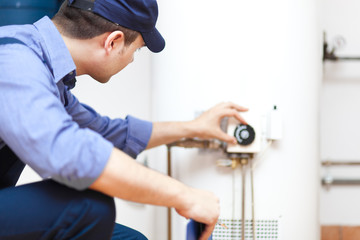Whether or not you should schedule an annual maintenance checkup with your water heater’s maintenance company depends on your water heater’s age, potential water hardness, usage, and environmental conditions. For instance, if you own a new water heater with a potassium scale of 7, have no standing water in the tank, and don’t use a water softening system, you can potentially go up to 5 more years trouble-free with a properly installed and maintained water heater. On the other hand, a ten-year-old water heater that uses hard water, no scale, and is properly scheduled for maintenance could pose a serious heat hazard and/or increase your water bill if not serviced.
If your water heaters are more than 50 years old, it is highly recommended that they be serviced and checked annually. Check the operating specifications for your water heaters and add a couple of extra parameters to the list: the minimum, hot water temperature, and maximum water pressure. You might also want to have a technician perform annual preventive maintenance run using a drain/pressure switch. Typically, Plumbers will do this once per calendar year. In addition to checking the water heater’s settings, this service also includes a drain purge port valve cleaning, a pre-filter inspection, a two-stage flush, and chemical tank testing.
With a built-in electronic relief valve, water heaters are required by law to include this device as part of their warranty. However, if your water heater has a built-in electronic relief valve but is still experiencing high water temperatures, it could be a symptom of a more serious issue such as a leak. If your relief valve is the only working valve, add relief valves to the other three valves in your set (for a three-way, etc. ).
You should also check the thermostat to ensure it isn’t excessively raising or lowering temperatures. Also, check to see if the water supply to the water heaters is clear. You can test the supply water by opening all of the supply valve valves. If they all open except one, then there may be a problem with the water heater itself. Your service technician will be able to test the water and pinpoint the problem.
If you suspect that your water heater is having mechanical problems, replace it with a certified unit for hot water use. There are many different models available to choose from, so be sure to get one that meets your needs. Some water heaters are dual-purpose units and can be used as hot water and heat water. Make sure you do not put the dual-purpose heater into use for purposes other than those listed above. Replace your damaged water heater immediately.

Another item to look for in your water heater’s maintenance leaks. You must inspect the lines coming in and out of the water heater to ensure nothing is leaking. Leaks can cause a malfunction in the hot water system and increase the chances for an emergency trip to the repair shop. If a hole is found, do not try to patch it on your own, as repairing a faulty water heater can be extremely dangerous.
Make sure to change the filter in your water heater once per year. The filter is usually located under the hot water tank. Once a month, remove the filter and wash it in your garden hose with hot water. Rinse it thoroughly. Reinsert the filter if it needs to be cleaned again.
When it comes to water heaters maintenance, prevention is always better than cure. By changing the filter in your water heater at least twice each year, there will be no problems with the water quality. This will keep your family from suffering from unpleasant symptoms such as headaches and sore throats. All family members must understand how to properly maintain their water heaters so that in the unfortunate event of a breakdown, one of them can rest assured knowing that help is on the way. It may cost a little extra money, but the peace of mind of having a functioning hot water heating system will make it well worth the extra cost.